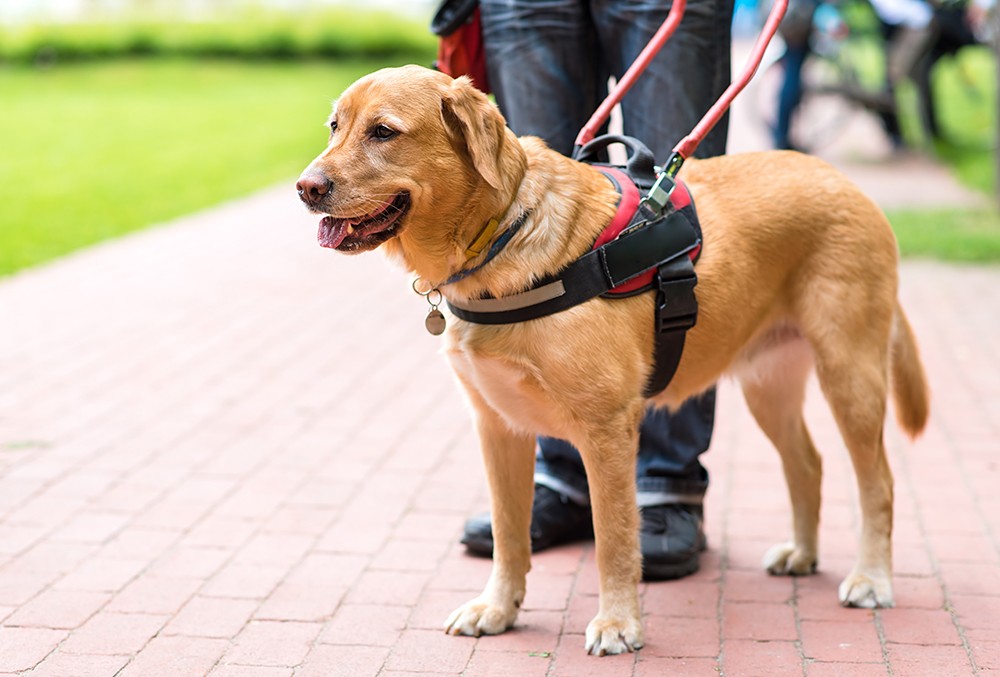Laws regulating the use and admissibility of service animals can be confusing for meeting planners and the facilities in which they hold their events.
Following are some key points for meeting planners and facilities—such as hotels and convention and conference centers—to consider when a meeting attendee arrives with a service animal, such as a dog.
My company, The Military Reunion Network, specializes in facilitating meetings such as reunions of veterans. My attendees often come accompanied by a service animal for any number of reasons, including as a doctor-prescribed treatment option to cope with PTSD.
The Military Reunion Network has been involved in situations where a front desk clerk inappropriately commented to an arriving veteran:
“Are you sure that is a service dog? You don’t look sick.”
It is not the place of a front desk clerk to question the dog’s role. In fact, according to the United States Justice Department, by law, staff may ask only two questions:
- Is the dog a service animal required because of a disability?
- What work or task has the dog been trained to perform?
Staff cannot ask about the person’s disability, require medical documentation, require a special identification card or training documentation for the dog, or ask that the dog demonstrate its ability to perform the work or task.
The United States Justice Department defines a service animal as dogs that are individually trained to do work or perform tasks for people with disabilities.
Examples of such work or tasks include:
- Guiding people who are blind.
- Alerting people who are deaf.
- Pulling a wheelchair.
- Alerting and protecting a person who is having a seizure.
- Reminding a person with mental illness to take prescribed medications.
- Calming a person with Post Traumatic Stress Disorder (PTSD) during an anxiety attack or performing other duties.
A Definition of Service Animals
Service animals are working animals, not pets. The work or task a dog has been trained to provide must be directly related to the person’s disability. Dogs whose sole function is to provide comfort or emotional support do not qualify as service animals under the ADA.
The United States Justice Department website goes on to state:
“Under the ADA, state and local governments, businesses and nonprofit organizations that serve the public generally must allow service animals to accompany people with disabilities in all areas of the facility where the public is normally allowed to go.
[Meetings Today Podcast: Laws Governing Service Animals]
"For example, in a hospital it would be inappropriate to exclude a service animal from areas such as patient rooms, clinics, cafeterias or examination rooms.
"However, it may be appropriate to exclude a service animal from operating rooms or burn units where the animal’s presence may compromise a sterile environment.”
The hospitality industry needs to be aware of and follow these rules established by the federal government:
- Staff are only allowed to inquire if the dog is a service animal required because of a disability, and what work or task the dog has been trained to perform.
- A person with a disability cannot be asked to remove his or her service animal from the premises unless: 1. The dog is out of control and the handler does not take effective action to control it, or 2. The dog is not housebroken. When there is a legitimate reason to ask that a service animal be removed, staff must offer the person with the disability the opportunity to obtain goods or services without the animal’s presence.
- Establishments that sell or prepare food must allow service animals in public areas even if state or local health codes prohibit animals on the premises.
- People with disabilities who use service animals cannot be isolated from other patrons, treated less favorably than other patrons or charged fees that are not charged to other patrons without animals. In addition, if a business requires a deposit or fee to be paid by patrons with pets, it must waive the charge for service animals.
- If a business such as a hotel normally charges guests for damage that they cause, a customer with a disability may also be charged for damage caused by himself or his service animal.
- Staff are not required to provide care or food for a service animal.
In addition, The Military Reunion Network recommends the following.
When interacting with service animals:
- Ignore the service animal if possible. They are working. Any attention from you takes them away from their job.
- If you are an animal lover and can’t resist the urge to pet them, always ask the owner for permission. They may give the dog a command or place them in a down position signaling to the animal that it is okay.
- Keep your attention on the animal brief.
Veterans or other meeting participants with service animals:
- Communicate upfront that you are traveling with a service dog when making hotel or airline reservations.
- Use a special collar or vest to identify the dog as a service animal if it does not impact the animals comfort or their ability to do their job.
In addition to the recommendations above, military reunion planners—and all other meeting planners—have a responsibility to alert their destination, hotel and transportation partners if a service animal is accompanying a reunion or meeting attendee.
In turn, the hospitality partners should conduct refresher training to ensure the highest level of customer service during the [event]. Service animal owners, meeting planners and hospitality representatives should be aware of state level service animal regulations.
[Related Content: Pechanga Resort Teams Veterans With Service Dogs]
There is increased skepticism by airline and hotel representatives about the validity of service animals, as false claims are on the rise.
Unfortunately, there is no central agency governing service animal registration. It is easy to obtain a vest or certificate for less than $30, turning the family pet into a service animal.
The ADA.gov website states the following:
“There are individuals and organizations that sell service animal certification or registration documents online. These documents do not convey any rights under the ADA and the Department of Justice does not recognize them as proof that the dog is a service animal.”
It is important to remember, there is no financial gain by those traveling with service animals. They do not receive a discount nor are they exempt from paying for damage caused by their animal. When in doubt, follow the state and federal guidelines.
It will go a long way in making your reunion, event or meeting a success!
This article was reprinted with permission from The Military Reunion Network.
Additional resources:
- U.S. Department of Justice, Civil Rights Division:
FAQs About Service Animals and the ADA - U.S. Department of Justice, Civil Rights Division:
ADA 2010 Revised Requirements, Service Animals - Disability Rights Washington
[Read This Next: SMERF Meeting Planners Share Successes and Challenges]






